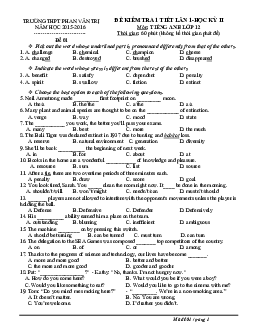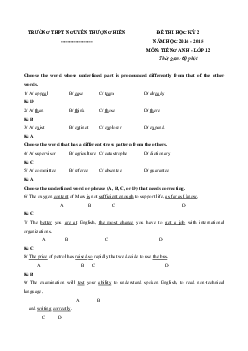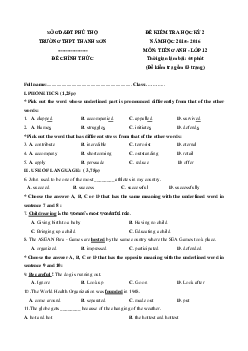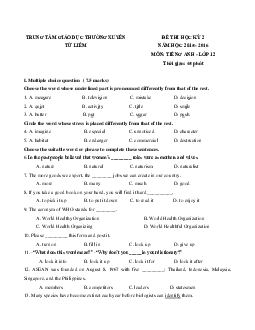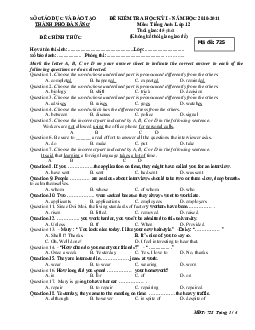







Preview text:
ĐỀ THI CUỐI HỌC KÌ 2 LỚP 12 NĂM HỌC 2018 - 2019 MÔN TIẾNG ANH
Mark the letter A, B, C, or D on your answer sheet to indicate the word whose underlined
part differs from the other three in pronunciation in each of the following questions. 1. A. design B. persuade C. pursue D. increase 2. A. donate B. imitate C. operate D. private
Mark the letter A, B, C, or D on your answer sheet to indicate the word that differs from
the other three in the position of primary stress in each of the following questions. 3. A. rewarding B. fascinating C. tedious D. challenging 4. A. compliment B. determine C. optimist D. marvellous
Mark the letter A, B, C, or D on your answer sheet to indicate the underlined part that
needs correction in each of the following questions.
5. By the end of the 21st century, scientists are discovering the cure for the common cold. A. the end of B. 21st century C. are discovering D. for
6. The shopkeeper wanted the boys don’t lean their bicycles against his windows. A. shopkeeper B. don’t C. their D. against
7. Although her friends tried to persuade her to apply for the job at a local factory, but
Christine refused to make an application. A. Although
B. tried to persuade C. to apply D. but
Mark the letter A, B, C, or D on your answer sheet to indicate the correct answer to each
of the following questions.
8. Have you had any news about that ___ you applied for yet? A. work B. job C. career D. vacancy
9. If my application is successful, I will be able to start work from 15th of August when I
finish all my exams. I am ___ my CV with this letter. A. mending B. attaching C. closing D. enclosing
10. Hellen usually ___ her childhood with great pleasure. A. talks back to B. thinks back on C. turns back to D. falls back on
11. Many students ___ school to set up their own businesses and become self-employed. A. move out of B. cut down on C. drop out of D. drop in on
12. By the time Ryan finally graduated from high school, he ___ five different schools
because his parents move frequently. A. attended B. was attending C. had attended D. has been attending
13. Some shops advertise their products and services in the newspaper to ___ customers. A. encourage B. attract C. interest D. promote
14. Why were you acting ___ you hadn’t seen the boss? A. the way B. as though C. like D. as
15. Unless you ___ me about Sue’s new bob hair, I wouldn’t have noticed. A. had told B. hadn’t told C. told D. didn’t tell
16. ___ with passion for teaching help raise the test scores of their students. A. Highly motivated tutor B. Highly motivated tutors
C. Tutors are highly motivated
D. Being highly motivated tutors
17. It seems that ___ my uncle travels abroad he forgets to take something he needs. A. whenever B. by the time C. not until D. however
18. Hayden spent ___ money buying food that he didn’t have enough left to buy a soft drink. A. such a B. a lot C. too many D. so much
19. A ___ described what he saw moments after the car bomb had exploded. A. passer-by B. by-passer C. pass-by D. by-pass
Mark the letter A, B, C, or D on your answer sheet to indicate the most suitable response
to complete each of the following exchanges.
20. Lan: “Do you think your schooldays are the happiest days of your life? - Nam: “___________”
A. I believe schooldays last forever.
B. Were you happy during your schooldays?
C. I think so. We are worry-free and full of ambitions in the schooldays.
D. We didn’t have schooldays when we were at school.
21. Hung: “How much do you earn in your new job?” - Xen: “ ______”
A. That’s a bit nosey of you B. You shouldn’t ask that C. I’m not your slave
D. You can be so bossy at times!
Mark the letter A, B, C, or D on your answer sheet to indicate the word(s) CLOSEST in
meaning to the underlined word(s) in each of the following questions.
22. Lucy has just finished her A-levels and she has got a place at university, but she would
really like a break from the academic world. Therefore, she decides to take a gap year and travel around the world. A. a year off B. a year out C. a year away D. a year’s trip
23. Nowadays, lifelong learning is facilitated by e-learning platforms. A. insisted B. assisted C. assessed D. accessed
Mark the letter A, B, C, or D on your answer sheet to indicate the word(s) OPPOSITE in
meaning to the underlined word(s) in each of the following questions.
24. Thanks to lifelong learning, people’s level of awareness has improved significantly. A. has increases B. has declined C. has gone up D. has bettered
25. I’d go mad if I had to do a dead-end job like to working on a supermarket checkout. A boring B. monotonous C. fascinating D. demanding
Mark the letter A, B, C, or D on your answer sheet to indicate the sentence that is closest
in meaning to each of the following questions.
26. “Why did you apply for the job?” her mother asked.
A. Her mother wanted to know the reason she applied for the job.
B. Her mother wanted to know the reason she had applied for the job.
C. Her mother wanted to know why did she apply for the job.
D. Her mother wanted to know why had she applied for the job.
27. I am on the tenth page of the report I am writing.
A. I have completed writing ten pages of the report.
B. Tonight I’m going to write the tenth page of the report.
C. So far I have written ten pages of the report.
D. I have finished writng the report on the tenth page.
28. I did far better than Chris in the exam.
A. Chris didn’t do as well as me in the exam.
B. I did farther than Chris in the exam.
C. Chris did worse than me in the exam.
D. I didn’t do worse than Chris had done.
Mark the letter A, B, C, or D on your answer sheet to indicate the sentence that best
combines each pair of sentences in the following questions.
29. I judge by the car he drives. I’d say he’s got a pretty good job.
A. Because I judge by the car he drives, I’d say he’s got a pretty good job.
B. When I judge by the car he drives, I’d say he’s got a pretty good job.
C. Unless I judge by the car he drives, I’d say he’s got a pretty good job.
D. Judging by the car he drives, I’d say he’s got a pretty good job.
30. Matthew ran away from home. Matthew thought no one loved him.
A. Matthew ran away from home as when Matthew thought no one loved him.
B. Matthew ran away from home because Matthew thought no one loved him.
C. Thought that no one loved him, Matthew ran away from home.
D. Matthew thought no one loved him and so that Matthew ran away from home.
Read the following passage and mark the letter A, B, C, or D on your answer sheet to
indicate the correct word or phrase that best fits each of the numbered blanks from 31 to 35.
If women choose to pursue a career once they have children, they often miss out on a close
(30)_____ with their children. Helen Jamieson is a mother of three who has given (31)_____
work to look after her children full-time. She strongly believes that women are pressurized
to do too much, driving themselves to the absolute limit. In her own case, after six years of
paid employment, Helen finally decided to call it a day. She says she initially found it hard
being at home, though she never misses the job itself. She admits that if she had had a
brilliant career to begin (33)_____, she might feel differently now. Financially, she is no
worse off (34)______ before, as the cost of childcare and commuting exceeded her actual
income. (35)______ the government starts to give other tax incentives to working parents,
she says she will not return to the workplace until her children are grown up. 31. A. friendship B. relationship C. scholarship D. membership 32. A. out B. in C. to D. up 33. A. up B. with C. to D. at 34. A. as B. so C. than D. then 35. A. Unless B. If C. Provided D. Even if
Read the following passage and mark the letter A, B, C, or D on your answer sheet to
indicate the correct answer to each of the questions from 36 to 40
In the exploration of the linguistic life cycle, it is apparent that it is much more difficult to
learn a second language in adulthood than a first language in childhood. Most adults never
completely master a foreign language, especially in phonology – hence the ubiquitous
foreign accent. Their development often “fossilizes” into permanent error patterns that no
teaching or correction can undo. Of course, there are great individual differences, which
depend on effort, attitudes, amount of exposure, quality of teaching, and plain talent, but
there seems to be a cap for the best adults in the best circumstances.
Many explanations have been advanced for children’s superiority: they exploit
Motherese (the simplified, repetitive conversation between parents and children), make
errors unselfconsciously, are more motivated to communicate, like to conform, are not set in
their ways, and have no first language to interfere. But some of these accounts are unlikely,
based on what is known about how language acquisition works. Recent evidence is calling
these social and motivation explanations into doubt. Holding every other factor constant, a
key factor stands out: sheer age.
Systematic evidence comes from the psychologist Elissa Newport and her colleagues.
They tested Korean and Chinese-born students at the University of Illinois who had spent at
least ten years in the United States. The immigrants were given a list of 276 simple English
sentences, half of them containing some grammatical errors. The immigrants who came to
the United States between the ages of 3 and 7 performed identically to American-born
students. Those who arrived between the ages of 8 and 15 did worse the later they arrived,
and those who arrived between 17 and 39 did the worst of all, and showed huge variability
unrelated to the age of arrival.
36. The passage mainly discusses _______.
A. adults differences in learning a foreign language
B. children’s ability to learn a language
C. the age factor in learning language fast
D. research into language acquisition
37. From the passage, it can be inferred that “phonology” is the study of _______. A. the grammar of a language B. the rules of a language
C. the vocabulary of a language
D. the sound system of a language
38. The word “cap” in the first paragraph is closest in meaning to _______. A. prize B. limit C. covering D. level
39. According to the passage, young children learn language quickly for all of the
following reasons EXCEPT _______. A. they make many mistakes B. they want to talk C. their approach is flexible
D. they frequently repeat words
40. In the experiment in the passage, the psychologists discovered that _______.
A. most students had lived in the U.S for more than 10 years
B. older students were unable to learn English
C. young students learned English best
D. students who arrived late were worst of all
